Wed 6 May 2020
A PI Book! Movie!! Review by David Vineyard: SYLVIA (1965).
Posted by Steve under Mystery movies , Reviews[5] Comments
E. V. CUNNINGHAM – Sylvia. Alan Macklin #1. Doubleday, hardcover, 1960. Crest d789, paperback, 1965. Also published as by Howard Fast: Carol Publishing, hardcover, 1992.
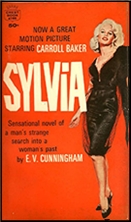
SYLVIA. Paramount Pictures, 1965. Carroll Baker, George Maharis, Joanne Dru, Viveca Lindfors, Peter Lawford, Edmond O’Brien, Aldo Ray, Ann Sothern, Lloyd Bochner, Jay Novello, Nancy Kovak. Screenplay by Sydney Boehm, Howard Fast (E. V. Cunningham), based on the latter’s novel. Directed by Gordon Douglas.
That’s the voice of private eye Alan Macklin (if it sounds familiar both Lew Archer and Philip Marlowe say close to the same thing), who specializes in digging into people’s past, whether they want to be uncovered or not. His love is ancient history, and it makes him good at digging into the history of the people he is hired to investigate. Luckily this looks like one of the nicer cases he might be called to exercise his skills on, one of those “moderately filthy jobsâ€.
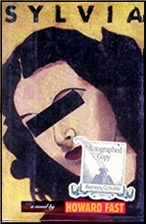
His client is one Frederick Summers, a cool piece of work, wealthy, patrician, attractive, and cultured and anxious to investigate his fiancé Sylvia West— No object on earth is so rigged with weary sound than the face of a beautiful woman, and with Sylvia it was the quality of the face not the measurement of it. She did not look like anyone else, she looked like herself.
There isn’t much to go on, either. Reasonably a man engaged to a woman might expect her to have a history, family, even distant family, but Sylvia appeared out of nowhere a year earlier, became engaged to Summers, the story she told him about who she was is a lie, and Summers wants to know the real story. He’s the scion of big money, oil money, and he wants no surprises popping up after he marries.
She writes poetry, indifferently, she speaks Chinese, but with a child’s vocabulary, she can mimic a faint British accent, she is well read, she has a passion for roses, and she has a peculiar way of phrasing things almost as if English wasn’t her first language.
Summers simply wants to know who she is, and he wants Macklin to do the job without ever meeting her. He doesn’t want her suspicious he is looking into her past. If she knew it would be the end of their engagement.
If it sounds like a variation on Laura it is. Macklin is going to delve into Sylvia’s past and the more he learns, the deeper the mystery and the closer he comes to being obsessed with and then in love with the woman and the mystery.
E. V. Cunningham was novelist Howard Fast who was a bestselling mainstream writer of books like April Morning, and wrote science fiction (under his own name) and a number of mysteries under various names, including Mirage which became a suspense film with Gregory Peck and Walter Matthau. His later books as Cunningham featured a Japanese-American policeman, but he also wrote a series of suspense novels all named after women, Sally, Penelope, Sylvia… several of which were filmed (all three of those named), and were often book club and Reader’s Digest choices.
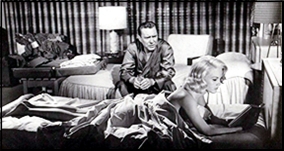
Sylvia was filmed with Carroll Baker in the title role, George Maharis as Macklin, and Peter Lawford as Summers. It looks pretty much like a television production, and features a cast of stars who often appeared on television as the suspects Macklin encounters while digging into Sylvia’s past. It’s not bad, but Maharis never quite registers as tough, world weary, and cynical as Macklin in the book, and Baker, a fine actress normally, is far too earthy and real for the mysterious Sylvia, who to be fair, turns out to be closer to Baker at books end as Macklin falls for the real Sylvia as opposed to the shadow Summer’s wants to possess.
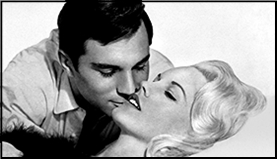
Despite how it might sound, I like the movie. It at least tries to be something more, thanks to the script by Boehm and Fast. It’s just that the structure of the movie is too much of a gimmick to sustain the promise of the novel. It becomes one of those which star will pop up next projects that too many films devolved into in that period.
And Macklin does finally solve both the mystery of Sylvia, and because Fast, under any name, is too good not to, it is Alan Macklin who proves to be more interested in being a decent human than a detective, and pretty much stamps all over all the Archers, Marlowes, and others who put loyalty to a client above the law and all else.
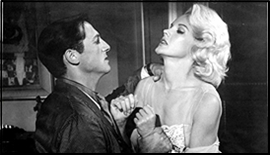
Sylvia is almost an anti-private eye novel. The ending throws the whole genre for a loop.
It’s that ending that makes this something more than just another hard boiled private eye novel, and a good one at that. Sylvia is ultimately a novel about a private eye and not a private eye novel.
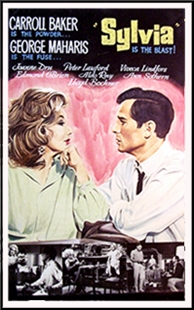
May 6th, 2020 at 10:48 am
I’ve seen nothing to indicate otherwise, so I think it;’s safe to say that this was Alan Macklin’s only recorded case. David, when you say the “ending throws the whole genre for a loop,” does that help explain why this is one and done for Macklin?
May 6th, 2020 at 8:37 pm
Yes, there is nowhere to go after the novel ends as far as his private eye career goes. Fast seems interested in showing the dark side of the genre with this one, and the novel is mostly about Macklin’s redemption so he can move on and become a better man, which Fast assures us he can’t be as a private eye.
Like all the Cunningham books this one is fairly short, straight forward, and moves well, but it’s more anti eye than standard private eye novel.
May 7th, 2020 at 9:58 am
The film benefits from a good cast and Gordon Douglas’ punchy direction.
I’m not sure, but it looks like the book came out after the emarkably similar THE SECRET OF SYLVIA (GM, 1958) by Lee Borden, reviewed here:
https://mysteryfile.com/blog/?p=1931
May 7th, 2020 at 10:22 pm
If not the story, it is a remarkable coincidence of names. Sylvia may have been a common one at one time,but no longer.
December 23rd, 2020 at 3:24 pm
Another oddball flick that a one-time chance circumstance brought my way. A rainy afternoon and I was trapped indoors with nothing else to do except loll around and watch the local station’s ‘Saturday Movie’.
But I remember liking this movie because of the atmosphere; and because it seemed close kin (in both photography and story) to another Maharis romp: Alistair MacLean’s ‘Satan Bug’ dir. by John Sturges.
A lot of shots of Maharis wandering around vast outdoor spaces of California. Highways and parking lots.